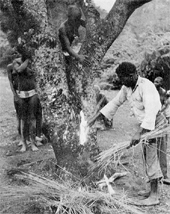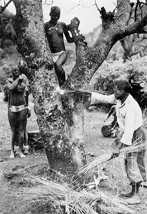Mavhavhe (the burning) is an example of a ngoma (singular form of dzingoma). It was usually done for the first time about ten to fourteen days after the beginning of domba, and then again at intervals when a sufficient number of new recruits warranted its repetition.
A soon as the morning light appeared, the master of initiation would order the novices to come out of the council hut. Blowing on a side-blown trumpet (phalaphala) made of the horn of a sable antelope (see Kirby 1934 :73-76), he would lead them to a suitable tree, which should have a fork in the trunk far from the base and be outside the ruler's home (i.e. 'in the bush'). The girls followed, carrying the alto and the tenor drums, and the assistant (nyamungozwa) would bring a bundle of dry grass and a burning ember from the domba fire.
The girls stood in a line behind the tree and sang domba. The master stood on the other side. Each girl in turn then climbed up and stood in the fork of the tree, while he waved a handful of burning grass to and fro near her. After a few moments, he would say "Masha!" The girl jumped down, performed losha humbly and returned to her place.
 Novices await their turn to perform the rite, whilst the first girl climbs up into the fork of a tree and the master of initiation prepares a 'torch' of burning grass. |
 The master waves the 'torch' near a novice. Notice the drums, which are brought so that domba can be played during the rite. |
This was meant to teach the girls they they should pluck or shave their pubic hairs. If an old woman were to inspect a girl and find that this has not been done, she would burn off her hairs with an ember of the fire. Women were warned that their pubic hairs could cause their lovers pain and inhibit smooth entry, and even precipitate detumescence or damage the penis.
To return, click 'Back' in the browser.